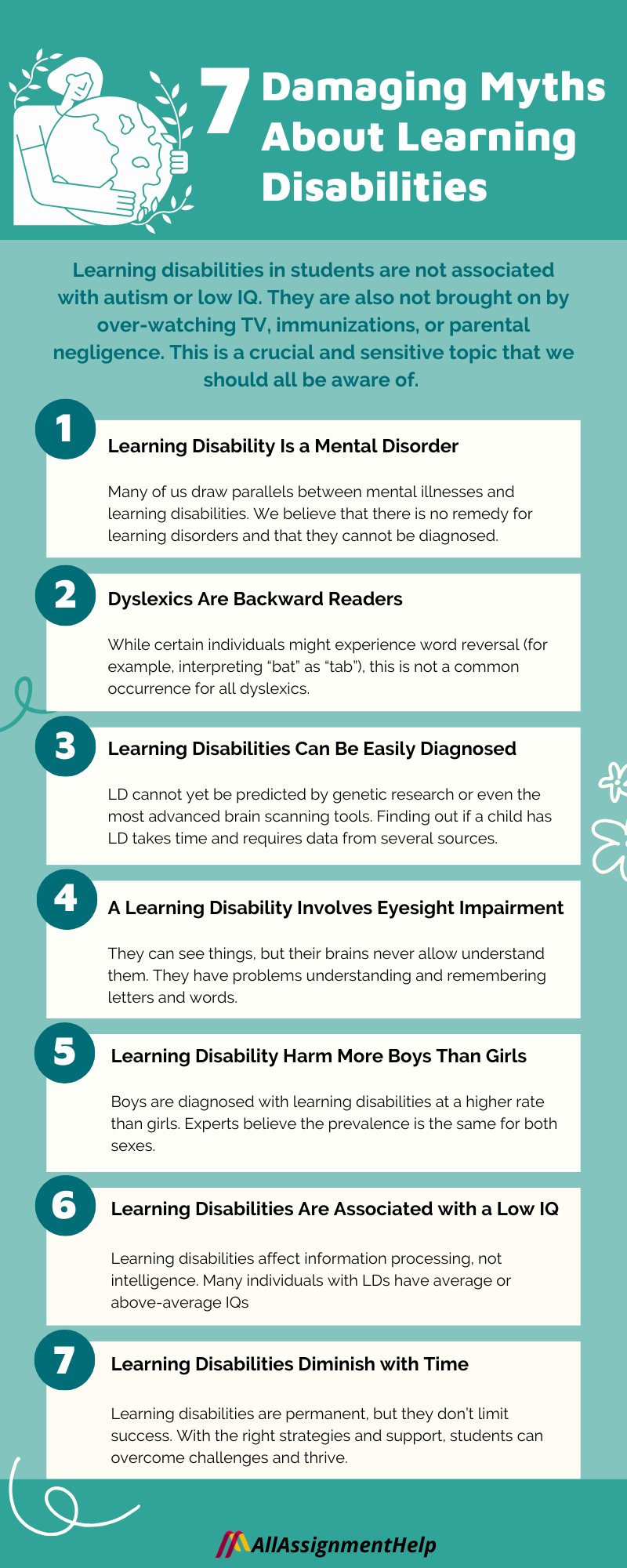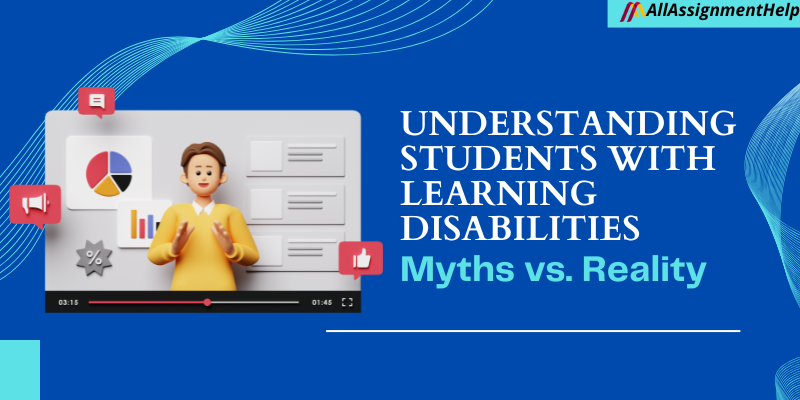Table of Contents
Learning disabilities are commonly known as “learning disorders.” It is a mental condition that prevents students from learning properly. It is important to distinguish between learning disabilities and learning problems, which are mostly caused by intellectual disabilities, emotional disturbances, visual, hearing, or motor impairments, or environmental, cultural, and economic disadvantages.
Students with learning disabilities are often intelligent, either average or above average. However, a common misconception is that learning disabilities are “not real” and “easily correctible.” This concept is completely false. In this blog of All Assignment Help, we will uncover all these misconceptions and provide a comprehensive understanding of learning disabilities in students.
What is Learning Disabilities?
The phrase “learning disability” refers to a broad group of neurological disorders that have multiple effects on learning.
These processing problems can make it more difficult to learn basic skills like math, reading, and writing. Additionally, they could hamper higher-order abilities including planning, organizing, abstract thinking, long- or short-term memory, and concentration.
Learning disabilities in students often include:
- Information processing through visual and audio methods. Therefore, this affects understanding, spelling, writing, and reading.
- Keeping information organized and following instructions, particularly those that involve several steps.
- Identifying or storing data from memory.
- Understanding handwriting.
- Problems in mathematics. However, such problems can be easily solved by hiring a mathematics assignment help expert online. They will guide and assist students in easily understanding math concepts.
Read Here: Major Learning Disabilities, Symptoms, and Treatment
Types of Learning Disabilities
There are seven types of learning difficulties encountered by students. A few of them are briefly explained below.
Dyslexia
Students with this condition have trouble reading, writing, or comprehending written content. The majority of these youngsters also have eyesight problems. Small paragraph memorization issues, improper sentence reading, and difficulty pronouncing written words are a few signs that can point to this syndrome.
Dysgraphia
Dysgraphia is a neurological disorder or brain damage that prevents students from writing neatly. They just fail to write letters, and their notes cannot be understood by anyone. A few of the symptoms of this learning disability are not writing properly, bad handwriting, problems with handling the writing tool, and reverse writing.
Dyscalculia
This learning disability is directly related to numbers. Students with this disorder often struggle to remember or write numbers properly. They fail to understand mathematical equations. Diagnosing these problems in the early stages is a bit difficult because most students don’t like working with mathematical problems.
Nonverbal Learning Disabilities
A nonverbal learning disability is a problem in which the student is unable to understand either verbal or body language. They fail to understand the gestures or facial expressions or have difficulty understanding the voice of the person. A few of the students stumble while talking and have less social interaction.
Visual or oral Learning Disabilities
Children who struggle with this learning challenge have poor eye coordination and are unable to read for longer than a few minutes. They often stutter when reading, have trouble picking out words in the text, or have the impression that the letters are moving as they read.
Students with any problem, trauma, or disability must be treated with love and care at all times. They should also be provided with special education support.
Are you interested in learning more about the mental illnesses of students? If so, studying educational psychology could be the perfect choice for you. This field helps you understand human behavior and the factors that influence learning. However, if you ever need support with your coursework, you can seek educational psychology assignment help from subject experts.
7 Damaging Myths About Learning Disabilities
Learning disabilities in students are not associated with autism or low IQ. They are also not brought on by over-watching TV, immunizations, or parental negligence. This is a crucial and sensitive topic that we should all be aware of. To shed light on this, we have included some common misconceptions about learning disabilities that you must know:

Myth 1: A Learning Disability Is a Mental Disorder
Many of us draw parallels between mental illnesses and learning disabilities. We believe that there is no remedy for learning disorders and that they cannot be diagnosed. However, this is not true as having a learning deficiency does not imply mental illness. Some children who have learning disabilities are excellent singers and artists. You are not worthless just because you have one problem. Furthermore, there are professional assignment help services available online to help such students and act as special education support for them.
Myth 2: Dyslexics Are Backward Readers
Although this is a common misconception, it is untrue. While certain individuals might experience word reversal (for example, interpreting “bat” as “tab”), this is not a common occurrence for all dyslexics. Some have trouble discerning single letters apart or putting several sounds together to make a word, while others have trouble reversing a single letter (reading “does” as “dose,”).
Myth 3: Learning Disabilities Can Be Easily Diagnosed
There is no quick and simple method to determine if a student has learning disabilities. There is no blood test or X-ray that can be done to determine this. Furthermore, LD cannot yet be predicted by genetic research or even the most advanced brain scanning tools. However, we do know that learning disorders are inherited and that a family history of academic challenges can serve as a risk factor. Finding out if a child has learning disabilities is a process that takes time and requires data from several sources.
Myth 4: A Learning Disability Involves Eyesight Impairment
Students with learning disabilities often struggle with reading, writing, hearing, and seeing. They usually don’t understand the things written on the board. Some assume that this is a case of poor vision or eyesight. However, this is not the truth. They can see things, but their brains never allow understand them. They have problems understanding and remembering letters and words. We must stop mixing this disorder with other body problems and accept that it is related to the brain.
Myth 5: Learning Disability Harm More Boys Than Girls
Although boys are diagnosed with learning disabilities at a higher rate than girls—66% of children in the United States receiving accommodations are boys. Experts believe the prevalence is the same for both sexes. However, girls are often overlooked, especially in online learning environments where their challenges may go unnoticed due to limited face-to-face interaction. This is where online class help services play a crucial role. These services possess a team of online class taker that provide personalized support and expert guidance. Moreover, they ensure both boys and girls receive the assistance they need to succeed academically despite their learning difficulties.
Myth 6: Learning Disabilities Are Associated with a Low IQ
As previously stated, students with learning disabilities may struggle to read. They might struggle to hold the pencil correctly and struggle to understand gestures. These conditions are known as dyslexia, dysgraphia, and nonverbal learning disabilities. Hence, you need to understand that if your student has these types of problems, don’t relate them to his or her IQ level, lack of motivation, or some other factor. This is because these types of students have good intelligence and work hard, but it takes a bit more time than normal children to complete some tasks.
Myth 7: Learning Disabilities Diminish with Time
Learning disabilities are permanent, but they don’t limit success. With the right strategies and support, students can overcome challenges and thrive. Just like an athlete with diabetes manage their condition while competing, students can adapt and excel with proper accommodations.
Besides, there is a common myth that students with learning disabilities often underperform in their exams. This is completely incorrect! They can perform well in their exams, whether it is taken online or offline if provided with proper guidance and assistance. Also, there are online exam help services where they can hire an exam taker by requesting, can you take my online exam for me? These services ensure that students receive the necessary support to excel in their exams without disrupting their regular learning schedules or other important activities.
Also Read: Special Education for Exceptional Students
Conclusion
Students should start learning how to stand up for themselves and discuss their learning disabilities as soon as possible. Fascinating longitudinal studies reveal that children with learning disabilities (LD) possess key success traits. Research indicates that the ability to effectively communicate their learning challenges has the most significant long-term impact—more than early diagnosis, general IQ, or years of special education support.
Students with learning disabilities can also reach out to us for assistance with their academic assignments, homework, and other writing tasks. Also, those enrolled in online classes and looking for a reliable place where they can ask, can you take my online class for me? can also get in touch with us to hire an online class helper. We provide complete academic assistance with both offline and online coursework.
FAQs
Is there any treatment for learning disabilities?
Unfortunately, there is no treatment for learning disabilities. However, special education teachers can assist the student in comprehending the material and performing well in school.
Do learning disabilities affect IQ?
Students with certain learning problems might find it difficult to show and/or acquire information and understand the material while having ordinary to above-average intellect.
Is a learning disability a mental health condition?
No, a learning disability is not a mental illness. It is a neurodevelopmental disorder that impacts the brain’s information processing.
What are some strategies for overcoming learning disabilities in students?
Learn about your strengths and put forth a lot of effort to nurture them. Make a list of your shortcomings that limit your life’s advancement as well. Create coping techniques to deal with those shortcomings.
